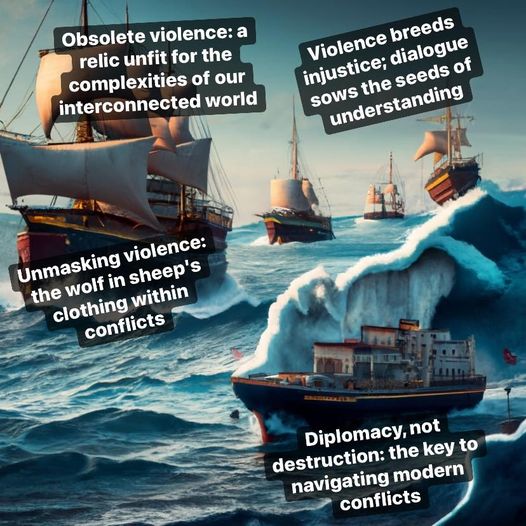
Those who embrace violence often cloak their actions in the guise of justice, akin to a wolf disguising itself in sheep’s clothing. However, in reality, violence acts as a raging fire that consumes the very essence of justice, leaving behind ashes of injustice in its wake. Rather than rectifying grievances, violence perpetuates a cycle of destruction, akin to a relentless fire that engulfs the principles of justice, leaving only devastation and inequality in its path. The ultimate weakness of violence is that it begets the very thing it seeks to destroy. Instead of diminishing evil, it multiplies it.
In the 21st century, resorting to violence to settle disagreements becomes increasingly obsolete and counterproductive. Just as ancient methods become outdated with time, violence stands as an archaic tool in conflict resolution. Our interconnected world now thrives on collaboration, mutual understanding, and dialogue. Resorting to violence resembles wielding a blunt, rusty tool in an era where precision instruments are available—tools that enable us to craft sustainable solutions, foster understanding, and promote peaceful coexistence. In a world where innovation, diplomacy, and cooperation pave the way forward, violence remains a relic of the past, incapable of addressing the complexities and intricacies of modern disputes.
Insistence on resorting to violence echoes adherence to outdated methodologies, ignorant of history’s transformative journey. Clinging to old maps in an age of satellite navigation, these methods fail to acknowledge humanity’s advancements. They seem detached from the collective wisdom acquired through humanity’s struggles and advancements, instead fixating on archaic approaches that have long been disproven as viable means of resolving conflicts.
People mired in outdated methods resemble captains steering ships guided by old, inaccurate maps, unaware of the vast changes in the terrain. The modern era calls for statesmanship that navigates the complexities of our time, leveraging diplomacy, empathy, and visionary strategies, leaving behind the antiquated notions of resolving conflicts through violence.

